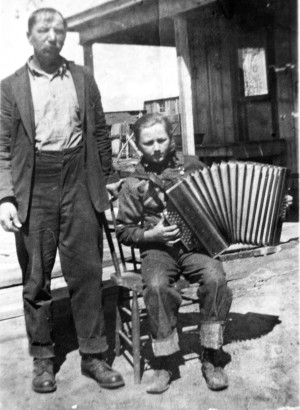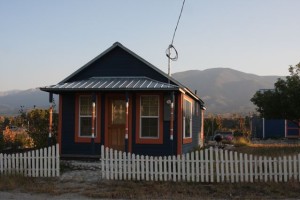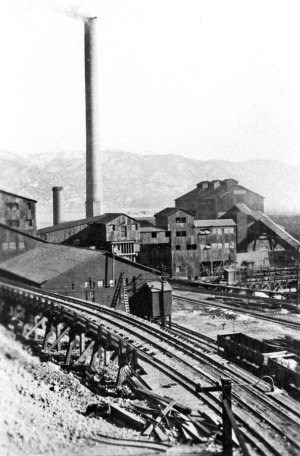By George Sibley
We continue to slog through the ordained stations on the way to the selection of our American Idol for the next four years. We’ve done the primaries – and it is hard to imagine a more entertaining cast of characters than the raft of Republicans who played out that version of the “Survivor” show. Now, as I write, the conventions – all theater-with-no-drama – are behind us, and aside from the barrage of daily coverage that might occasionally turn up some kind of a “47 percent” bonanza, we have only the debates-with-no-discussion to look forward to having behind us. Oh, and the voting of course.
What I wonder, from down on the ground, is what this whole circus has to do with us. By “us,” meaning “we the people,” I guess, although that has become a vaguely inclusive term that might be more vague than inclusive. In the time that I have been around in a conscious way, I have seen the American electorate shredded – by the mainstream media, its pollsters, its academic analysts, and the party ideologue. Shredded into so many interests and factions, so many ever-shifting majorities and minorities, that I am not sure we could still say there is any one thing we can all agree is a shared quality of “the American people.” Unless it might be a shared suspicion that our government is either in a real mess at this point – or maybe is just a real mess.
This suspicion leads to questions. Like – why is there still a “horse race” in this election when the Republican party can only cobble up a campaign based on the “failed promises” that never got a shot at implementation because of Republican obstructionism, and on a return to the failed policies of the Bush administration? Are our memories so short? Or have we just become so ideologically constipated that we vote “my party right or wrong?”
The conduct of this campaign and the role of money in it raises questions for me about whether we are even still what could be legitimately called a democracy. Why did Obama, from literally the day after his inauguration, establish a presidency that essentially carried forward most of the policies of his predecessors? Democrats and Republicans are working hard to establish distinctions, but both parties are funded by a relatively small percentage of “we the people” (including those “corporation-people”), all wealthy, many of whom hedge their bets by funding both sides. And we can be sure that, whichever party wins the election – congressional as well as presidential – the military-industrial complex will do fine and we will still be diverting at least half of our commonwealth toward the creation of a bigger hammer for a world in which everyone else looks like a nail. We will still be allowing “homeland security concerns” to erode our constitutional rights; we will still be allowing corporate entities “too big to fail” to grow even bigger and more aggressive in their risk-taking, knowing they are too big to be allowed to fail. We can also be sure that the wealthy who funded the election circus will grow wealthier with only light challenges, while the middle class – which does indeed pay taxes – will continue to be under comparatively heavy attack because of condescending abstractions about us freeloaders and self-styled victims.
This being the case – why do we not face the reality that we have basically become one of those one-party states we used to laugh at – call it the Corporate Party, or the (Military-Industrial) Complex Party. A party divided for old time’s sake into two wings over issues like women’s rights or gay rights. At the same time it works hard on its central goal of eliminating significant opposition to its economic goals, which extend to a global power that will be beyond the control of mere nation states – especially states pretending to lean toward democratic governance.
Those are the kind of questions that have been roiling around in my mind this year, watching the Corporate Party and its pocket media trying to hold our attention on an election that is “rigged” to the extent that, whoever wins the electoral tally, the people (including their corporate “persons”) who are funding the election will win regardless.
But I’ve just been blessed with a weekend of relief from those abstract question about where I myself fit into the mess of abstractions we continue to call America. Relief came at the 23rd annual Headwaters Conference at Western State Colorado University (formerly Western State College). Headwaters is a conference addressing issues in the region generally congruent with the “Central Colorado” of this magazine. In fact, Ed and Martha Quillen, founders of this magazine, were “elders” of the Headwaters conference, present most years from the beginning, both as participants and as critics (in this magazine) trying to shape us up. Ed once said that if he were filing a paternity suit for Colorado Central, he would probably pin it on the Headwaters conference, which opened his eyes to the possibility of a publication articulating and defining a very interesting region with unique issues.
The Headwaters topic this year was a good antidote to the political season: “Beyond Both Sides: Unexpected Partnerships in the Headwaters.” The keynote speaker Friday night was Courtney White of the Quivira Coalition, based in Santa Fe. Quivira works – with considerable success – to bring together ranchers with conservationists and environmentalists. White grants the ranchers of the region their claim to being the region’s first conservationists, but counters with the claim that even the oldest dogs can learn new tricks. Without insulting anyone with blame, White and his staff manage to bring ranchers and other landowners together with new ideas for restoring the vitality and sustainability of grazed lands that have suffered damage over time.
Bringing White to Western for this conference was timely. Quivira has helped facilitate a three-way partnership in the Upper Gunnison valley between rancher Brett Redden, Nature Conservancy Senior Planner Betsy Neely, and an old man named Bill Zeedyk who has spent his life learning how streams work, and how to restore the severed relationships between gullied streams and their former dried-out floodplains. Zeedyk has written a how-to book about his work, with the intriguing title: “Let the Water Do the Work.”
Neely is working on what might be the first concerted effort to address the challenge of adapting to climate change – a looming issue that is being thoroughly ignored by those paying for the election. In the Upper Gunnison, The Nature Conservancy is using the “almost-endangered” Gunnison Sage Grouse as its “canary in the mine.” Redden has a fair amount of sage grouse terrain on his ranch, and some other terrain that would be good for the little birds if it had more grass along with the sage. But an intermittent stream that flows through some of the land has been gullying for years – not dramatically, but enough to keep the water table too low for grass to root in the adjacent areas. So Neely got Zeedyk and Redden together, along with a lot of rocks for small structures in the stream bed that will, if Zeedyk’s designs work as they have elsewhere, restore meanders to the stream and turn the area back into a small floodplain with a high water table.
Part of the conference was a field trip to Redden’s ranch, where he showed us the work he and Zeedyk were doing, with funding and volunteer crews (most from WSCU) assembled by Neely. There is more that could be said about that conference and other “unexpected partnerships” that go “beyond both sides.” But all I really want to say is that the afternoon field trip where a rancher’s sense of integrity with his land, and a smart old man’s knowledge of how water likes to work, brought together by a conservationist organization, felt like a “political alternative” to me. An alternative to the abstracted madness we are wrestling with at the national level, where the money script calls for conservationists and environmentalists to be in conflict with “small business.” It didn’t hurt that it was a beautiful September day up in Redden’s fields, with all the trees and bushes as far as the eye could discern going to fall yellows. The election faded to distant thunder beyond the horizon.
That’s not a bad analogy. More and more, I feel about Washington the same way I feel about the weather. It is something I have to pay some attention to because it is going to impact me, but I have no personal impact on it. When it rains, I have to put on a coat; when the taxes come due, I have to shed some money. The weather brings both blessings and curses, depending on how I adapt to what it brings. So does Washington, but my dislike for droughts or depleting foreign adventures makes no difference in whether those will come down on us. Down on the ground, we learn to live with whatever the natural and cultural environments rain down on us, or don’t.
I will vote – once more for what appears to be the lesser of two evils. But I feel totally irrelevant in the national theater that this dumb-show of democracy seems to be about; whoever is elected, the government will get in, and I do not expect that “cultural climate” to improve. Which makes it all the more positive to see “unexpected partnerships” causing good things to actually get done down on the ground, with non-government organizations working on private lands.
George Sibley is a freelance writer who has just completed a big, fat, beautifully illustrated history of the development of Colorado’s share of the Colorado River – “Water Wranglers,” soon available in Colorado bookstores.




